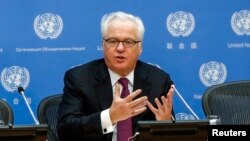Russia is holding up Security Council approval of establishment of a new international body that for the first time would assign blame for chemical attacks in Syria's deadly conflict.
Vitaly Churkin, Russia's U.N. ambassador, who holds the council presidency in September, told reporters Wednesday that Russia had questions about the proposal by U.N. Secretary-General Ban Ki-moon.
He also raised the possibility that the council might need a new resolution to deal with allegations that the Islamic State extremist group has used chemical weapons including mustard gas in neighboring Iraq.
The Syrian government denies using chemical weapons, but the United States and other Western nations contend Syria's government is to blame, especially for barrel bombs containing chlorine and other toxic agents dropped by helicopters, since the opposition doesn't have aircraft.
Ban sent a letter to the council last Thursday recommending establishment of a three-member independent panel backed by experts with the freedom to go anywhere in Syria to identify those responsible for using chlorine and other chemical weapons. The council was supposed to respond in five days.
Churkin said Russia had received clarifications about its concerns from the U.N. Secretariat and wanted them to be put in writing "so that everybody has the same kind of understanding of what is going to happen in the work'' of the so-called Joint Implementation Mechanism.
He said one example was Ban's call for voluntary contributions to fund the new body and Russia's concern that contributions could influence the "impartiality'' of the new body. He said "some good explanations were given about how the money is going to be spent.''
Last month, the council unanimously approved a resolution giving a green light to establish an international investigative body to determine responsibility for chemical attacks that have killed and injured a growing number of civilians over the past two years — and to go to suspect sites in government- and opposition-controlled areas. But council members also need to sign off on Ban's plan for the new body.
Reports have also surfaced in recent months that the Islamic State extremist group, which controls a third of Syria and Iraq, has used toxic chemicals. Churkin said Russia knows that the group has been "actively working'' in this direction, including "using the services of some foreign experts to try to produce chemicals that can be used as a weapon.''
He said Russia was very concerned about reports that Islamic State militants might be using toxic chemicals in both countries and had been discussing the reports with the Iraqi government, which is taking them seriously and "looking into it themselves.''
In the case of Syria, "the Security Council has played an important role in dealing with this problem,'' Churkin said, but in the case of Iraq, Russia believes the council may need to adopt a new resolution at some point.







